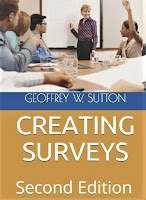For a list of the items and more details, see the reference below (Exline, Pargament, Grubbs, & Yali, 2014).
Based on Exline et al. (2014) and a general reading of the topic, I define religious/ spiritual (RS) struggles as experiences of personal concern linked to RS beliefs, practices, values, or experiences, which negatively affect thinking, feelings, or behavior, relationships, or health.
The Six Domains of Spiritual Struggles
Following is a quote from page 208 of the 2014 article, which describes the six domains. I have added bold text to help readers identify each domain. Note, r/s is a common abbreviation for religious/spiritual.
The measure assesses six domains of r/s struggle: divine (negative emotion centered on beliefs about God or a perceived relationship with God), demonic (concern that the devil or evil spirits are attacking an individual or causing negative events), interpersonal (concern about negative experiences with religious people or institutions; interpersonal conflict around religious issues), moral (wrestling with attempts to follow moral principles; worry or guilt about perceived offenses by the self), doubt (feeling troubled by doubts or questions about one’s r/s beliefs), and ultimate meaning (concern about not perceiving deep meaning in one’s life).The Brief RCOPE also contains items related to spiritual struggles but is more focused on coping than the RSS I reviewed here. Also note, in the article about the RSS (Exline et al., 2014), the authors view negative religious coping as another way of framing RS struggles.
Scale items
See the references for a complete list of the items and the domains. See the quote above for a description of the items within each of the six domains.
Each item is rated on a 5-point scale where 1 = not at all/does not apply and 5 = a great deal. Researchers average the item scores to obtain a total score and subscale scores.
Spiritual Struggles and Mental Health
All of the RSS subscales predicted mental health criteria.*
The best predictors of emotional distress related to religious and spiritual struggles were the Ultimate Meaning and Divine subscales of the RSS.
The RSS Interpersonal and Moral subscales predicted loneliness
The functioning of the RSS Doubt subscale suggested the possibility that in some cases doubt might not link to distress.
* Mental health variables were: Depression, Anxiety, State Anger, Life satisfaction, Loneliness, and Presence of life meaning
For a study of the relationship between this RSS measure and the RCOPE scale, see Wilt et al. (2022).
Creating a Survey
The RSS and other measures may be added to surveys along with other items when researchers follow the permission instructions. Learn more about Creating Surveys. Creating Surveys is an easy to read and recommended text and resource required by professors at graduate and undergraduate universities.
Get help Creating Surveys on AMAZON or GOOGLE Worldwide
Permission and copyright (from PsycTESTS):
Test content may be reproduced and used for non-commercial research and educational purposes without seeking written permission. Distribution must be controlled, meaning only to the participants engaged in the research or enrolled in the educational activity. Any other type of reproduction or distribution of test content is not authorized without written permission from the author and publisher. Always include a credit line that contains the source citation and copyright owner when writing about or using any test.
Cite this post
Sutton, G. W. (2020, January 22). Religious and Spiritual Struggles Scale Julie Exline et al. Assessment, Statistics, and Research. Retrieved from https://statistics.suttong.com/2020/01/religious-and-spiritual-struggles-scale.html
Related Posts
Resource Link- list of tests on this blog: A – Z Test Index
References
Exline, Julie J., Pargament, Kenneth I., Grubbs, Joshua B., & Yali, Ann Marie. (2014). The Religious and Spiritual Struggles Scale: Development and initial validation. Psychology of Religion and Spirituality, 6(3), 208-222. doi:https://dx.doi.org/10.1037/a0036465
Exline, J. J., Pargament, K. I., Grubbs, J. B., & Yali, A. M. (2014). Religious and Spiritual Struggles Scale [Database record]. Retrieved from PsycTESTS. doi: https://dx.doi.org/10.1037/t36191-000
Wilt, J. A., Exline, J. J., & Pargament, K. I. (2022). Coping with religious and spiritual struggles: Religious and secular techniques. Spirituality in Clinical Practice. https://doi.org/10.1037/scp0000289.supp (Supplemental)
The RSS scale contains items that may be useful to clinicians considering religious and spiritual concerns raised by counseling clients.
Learn more about counseling statistics in: Applied Statistics Concepts for Counselors on AMAZON or GOOGLE
See how to include spirituality and other items in survey research in Creating Surveys on AMAZON or GOOGLE





Comments
Post a Comment